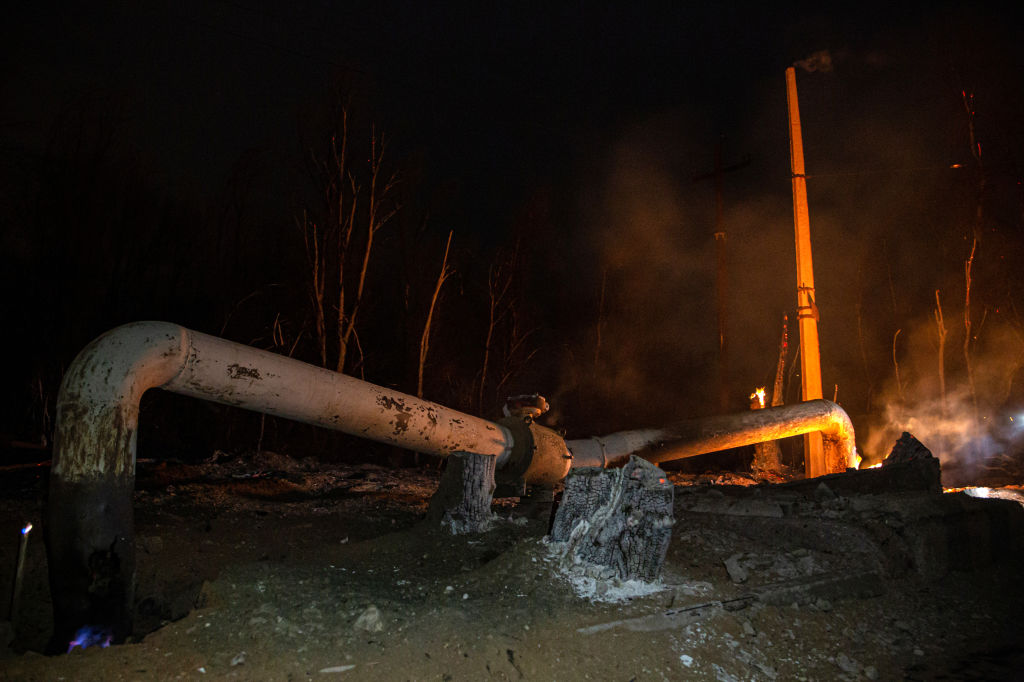
Svitlana Krakovska, a Ukrainian meteorologist, was wary of speaking her mind. On Sunday, sitting next to her sons’ bunk beds in her Kyiv home, she joined a Zoom meeting of the International Governmental Panel on Climate Change (IPCC), which was giving final approval for Monday’s landmark report on climate adaptation. IPCC rules discourage delegates from discussing political issues, and Krakovska says she deeply respects the institution.
But to Krakovska, 53, the air raid sirens that she and her family were intermittently sheltering from, as Russian missiles threatened the Ukrainian capital, were deeply connected to the report’s subject. “The money that is funding this aggression comes from the same [place] as climate change does: fossil fuels,” she says over Zoom on Monday. “If we didn’t depend on fossil fuels, [Russia] would not have money to make this aggression.”
Krakovska’s point—which she made in an impassioned address to colleagues at the meeting, prompting the Russian delegation to issue an apology for the invasion—has been made by others. Many commentators have accused Western powers like Germany and the U.S. of dragging their heels in responding to Russian threats to Ukraine because of their fears of worsening a global fuel price crisis. Others have pointed out that Russia’s ability to finance its Ukraine invasion depends in large part on its export of oil and natural gas, which combined accounted for 36% of its national budget last year. (“Every barrel of Russian oil and every cubic meter of Russian gas is now full of the blood of Ukrainians,“ Ukrainian lawmaker Oleksiy Goncharenco said in a video posted to Twitter Thursday.)
Read More: Why Sanctions on Russia Aren’t Targeting Oil and Gas
But as head of Ukraine’s delegation to the IPCC, Krakovska is uniquely placed to understand how the two major crises facing her country—and the global political order—are linked. The world will struggle to confront a problem as sprawling and complex as climate change, and implement the IPCC’s recommendations, without the rules-based order that Russia is challenging in its invasion, she says, citing the threat to international collaboration, as well as the potential for increased conflicts over resources. “If any big country can just take its neighbor, with rich soil, good water management, and good forests, we cannot deal with climate change,” she says. “If we lose, all other countries lose. Because they will not stop.”
The IPCC report warned that Europe is warming at faster than the global average rate, spelling increased water scarcity and losses in agricultural production, and that efforts to adapt the region to climate change were showing only “incremental” progress.
The current cycle of IPCC assessments is the first set of reports to include Ukrainian scientists as lead authors. Krakovska’s team had been preparing a large press conference and planned to use the momentum to apply for new grants for projects—after eight years in which Ukraine has struggled to fund scientific research as it focused on building up its army after Russia annexed Crimea, Krakovska says. That work is in limbo now, as the nation’s scientists, like other Ukrainians, take shelter in their homes or flee their country.
A grim joke has been circulating in Ukraine: that this is indeed World War Three, with Russia fighting for Russia, and Ukraine fighting for the rest of the world—voicing a frustration with the lack of military support from the U.S. and the E.U. “The only good thing is that we are so united now in Ukraine—you can’t even imagine,” Krakovska says. “Before we had a lot of fighting inside, but now we have one goal. This is how we should be with climate change.”
More Must-Reads From TIME
- Dua Lipa Manifested All of This
- Exclusive: Google Workers Revolt Over $1.2 Billion Contract With Israel
- Stop Looking for Your Forever Home
- The Sympathizer Counters 50 Years of Hollywood Vietnam War Narratives
- The Bliss of Seeing the Eclipse From Cleveland
- Hormonal Birth Control Doesn’t Deserve Its Bad Reputation
- The Best TV Shows to Watch on Peacock
- Want Weekly Recs on What to Watch, Read, and More? Sign Up for Worth Your Time
Write to Ciara Nugent at ciara.nugent@time.com